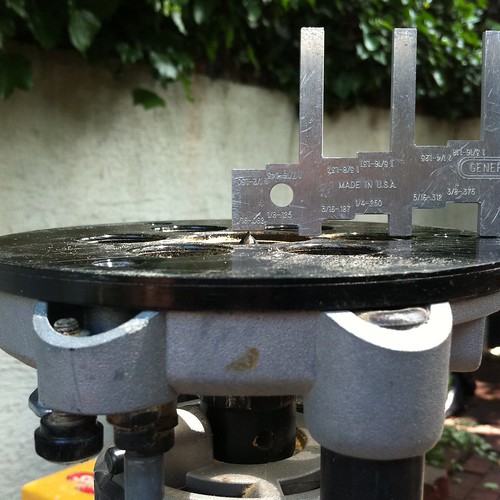I've been doing some significant woodworking in some capacity for the last eight years, and some of the projects I've worked on are what many people would consider intermediate to advanced. One tool I've come to rely on quite extensively is my router gauge to measure my depth of cut. It was actually an impulse buy that I picked up while ordering a router bit set but I had no idea how much I would actually end up needing it.
When working with a router, circular saw, or table saw, you are often faced with situations where you must make cuts at a very specific depth. In these projects, the accuracy of your depth of cut will make or break the ultimate outcome of your work. If you're off by less than 1/32", you can end up with unsightly lines, weak joints, or a generally sloppy appearance that lacks uniformity.
If you have a good depth of cut gauge to help you ensure an accurate cut depth, it takes out a lot of the standard guess work, tons of extra test cuts, and ultimately saves you a lot of time in the wood shop.
This is another situation where a "keep it simple" philosophy will do quite well. There are depth of cut tools on the market that are digital, have sliding components, are tension mounted, or have the ability to check your email (ok, maybe I made up the least feature). Of all of the depth gauges I've used, the one that works best is a simple aluminum template with the various possible cut depths measured by 1/16" increments. I believe it may also be the least expensive option.
The package I'm suggesting also comes with a table saw gauge. I've been using my router gauge for the table saw, and it works well, but dado setup is more difficult because of the gauge's openings. I'm going to order this one so that I can get the table saw gauge as well. This should also help when I'm consistently misplacing my current gauge.
I can't overstate how important this tool has been. I use every time I want to make a dado or kerf cut, almost every time I setup the router, and whenever I want to double check the depth or width of a cut with something that I know won't make a mistake. Measure twice and cut once, but be even more confident in your measurements with this tool.
Do you have a good depth of cut gauges or method of ensuring accurate cuts? Let me know if you do, I'm interested to hear about them.

![]()
![]()